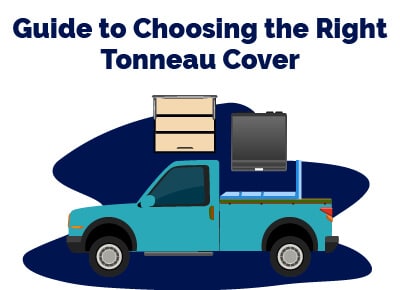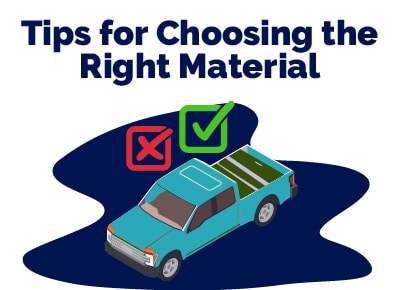Decoding Tonneau Cover Materials: Your Guide to Choosing the Best Option
September 5, 2023


Michael Collado is a car buying expert and has been a professional automotive writer since 2009. He’s written about dealership sales, vehicle reviews and comparisons, and service and maintenance for over 100 national automotive dealerships. Previously, Collado was a copywriter at the ad agency TBWA/Chiat/Day where he worked on brand campaigns for Nissan, ABC Television, Sony PlayStation, and Energizer. His recognition in the ad industry includes awards from Communication Arts and The Clios.
Collado has a Bachelor’s degree from the University of South Florida, with a major in Psychology and a minor in Marketing.
Selecting the right tonneau cover material for your truck might seem straightforward, but it holds more significance than you might think. Considering factors such as durability, weather resistance, and aesthetics is crucial when making this decision.
Here, we'll take a look at tonneau cover materials, highlighting their pros and cons, and providing expert tips to help you make an informed choice.
Table of Contents
Understanding Tonneau Cover Materials
A. Common Materials Used
 Vinyl: Vinyl tonneau covers are a popular choice due to their affordability and easy installation. They offer good weather resistance and can withstand light rain and snow. However, they may lack the security and durability offered by other materials.
Vinyl: Vinyl tonneau covers are a popular choice due to their affordability and easy installation. They offer good weather resistance and can withstand light rain and snow. However, they may lack the security and durability offered by other materials.- Aluminum: Known for their durability, aluminum tonneau covers offer excellent security and a sleek appearance. They are resistant to weather elements but can be noisy in heavy rain or wind. They're also prone to dents, and their metal surface can get hot in direct sunlight.
- Fiberglass: If security is a top priority, fiberglass tonneau covers are a strong contender. They can be painted to match your truck, offering a custom look. However, they are heavier, more expensive, and can be challenging to install. Additionally, they might limit bed access compared to folding covers.
- Canvas: Canvas tonneau covers provide classic aesthetics and are a more affordable option. They are flexible and easy to fold, allowing for versatile bed access. However, they may offer lower security and require more frequent maintenance due to their fabric nature.
B. Factors to Consider When Choosing Material
- Durability and Longevity: Depending on how you use your truck, the level of durability required can vary. If your truck faces rugged usage, a more robust material like aluminum or fiberglass might be suitable.
- Weather Resistance: Your local climate plays a significant role. If you often encounter heavy rain or extreme temperatures, opting for a material with high weather resistance is advisable.
- Aesthetics and Style: Your tonneau cover's appearance contributes to your truck's overall look. Materials like fiberglass can be painted to match your truck's color, while others might offer a more classic or rugged appearance.
- Maintenance and Cleaning: Consider how much time you're willing to invest in maintaining your cover. Some materials require more upkeep than others to retain their appearance and functionality.
Pros and Cons of Popular Tonneau Cover Materials
The four most popular materials for a tonneau cover are vinyl, aluminum, fiberglass, and canvas.
Here, we will take a look at the pros and cons of each type of material.
1. Vinyl Tonneau Covers
Pros
- Affordable: Vinyl tonneau covers are often the most budget-friendly option, making them accessible to a wide range of truck owners.
- Lightweight and Easy to Install: They are lightweight, which makes them easy to handle during installation. They typically don't require complex tools or a lot of time to set up.
- Good Weather Resistance: Vinyl covers can provide decent protection against light rain, snow, and UV rays. They're suitable for moderate weather conditions.
Cons
- Limited Security: These covers offer minimal security against theft and unwanted access to your truck bed. They can be easily cut or punctured.
- Susceptible to Wear and Tear: Over time, vinyl covers can show signs of wear and tear, especially in harsher weather conditions or with rough handling.
- May Fade Over Time: The sun's UV rays can cause the vinyl material to fade and lose its color over extended periods of exposure.
2. Aluminum Tonneau Covers
Pros
- High Durability: Aluminum tonneau covers are known for their robustness and ability to withstand various challenges, including impacts and weather elements.
- Excellent Security: These covers provide strong security for your truck bed, deterring theft and keeping your cargo safe.
- Sleek Appearance: Aluminum covers often have a modern, streamlined look that can enhance the aesthetics of your truck.
Cons
- Can Be Noisy in Rain or Wind: The metal surface of aluminum covers can create noise when raindrops hit or when strong winds blow over them.
- Prone to Dents and Scratches: While durable, aluminum covers are not immune to dents and scratches, especially if heavy objects are placed on top.
- Can Get Hot in the Sun: Aluminum absorbs heat and can become hot to the touch when exposed to direct sunlight for extended periods.
3. Fiberglass Tonneau Covers
Pros
- Superior Security: Fiberglass covers offer high security levels, similar to hardtops, making it difficult for unauthorized access to the truck bed.
- Paintable and Customizable: You can paint fiberglass covers to match your truck's color, creating a seamless and personalized appearance.
- Great Weather Protection: These covers provide strong protection against the elements, keeping your cargo safe from rain, snow, and sun.
Cons
- Heavier and More Expensive: Fiberglass covers are heavier than some other options, which can affect fuel efficiency. They also tend to be pricier due to their enhanced features.
- Complex Installation: Installing fiberglass covers can be more involved and might require professional help for proper fitting.
- Limited Bed Access: Some fiberglass covers may hinder full access to your truck bed, as they might not be as easily folded or rolled up as other covers.
4. Canvas Tonneau Covers
Pros
- Classic Aesthetics: Canvas covers provide a traditional and timeless appearance that can complement various truck styles.
- Affordable Option: You’ll often find that canvas covers are often more budget-friendly than their hard counterparts, making them a cost-effective choice.
- Flexible and Easy to Fold: These covers are designed for easy folding, allowing you to access your truck bed quickly and conveniently.
Cons
- Lower Security: Canvas covers offer less security compared to harder materials. They can be cut or manipulated more easily.
- Limited Durability: Overall, canvas covers may not withstand harsh weather conditions or heavy use as well as harder materials.
- May Require Frequent Maintenance: Finally, these covers might need more regular cleaning and maintenance to prevent mold, mildew, and fading.
Expert Tips for Choosing the Right Material
 Assess Your Needs and Usage: Consider your truck's purpose and how often you'll be using it to determine the necessary level of durability and security.
Assess Your Needs and Usage: Consider your truck's purpose and how often you'll be using it to determine the necessary level of durability and security.- Consider Local Climate and Weather Patterns: Your environment greatly impacts the material's performance. Choose a material that can withstand the prevailing weather conditions.
- Think About Aesthetics and Style: Match the cover's appearance to your truck's overall style and your personal preferences.
- Evaluate Installation Complexity: Depending on your DIY skills, choose a cover that aligns with your comfort level for installation.
- Budget Considerations: Set a budget that balances your desired features with affordability.
Best Car Deals by Category
Frequently Asked Questions
Are soft or hard tonneau covers better in terms of material?
Both soft and hard tonneau covers have their advantages and disadvantages. Soft covers like vinyl and canvas offer flexibility and affordability, while hard covers like aluminum and fiberglass provide superior security and durability.
Can I paint my fiberglass tonneau cover to match my truck?
Yes, fiberglass tonneau covers can be painted to match your truck's color, offering a seamless and customized appearance.
Do different tonneau cover materials impact fuel efficiency?
Tonneau covers, regardless of material, generally improve aerodynamics and can lead to a slight increase in fuel efficiency. However, the impact is often marginal.
How do I maintain and clean different tonneau cover materials?
Maintenance varies by material. Soft covers can be cleaned with mild soap and water, while hard covers may require specialized cleaners. Regular cleaning helps prevent deterioration.
Can I install a tonneau cover myself, or should I seek professional help?
Many tonneau covers come with straightforward installation instructions, making DIY installation possible. However, if you're unsure, seeking professional assistance ensures proper fitment and functionality.
Posted in Car Buying Tips |



